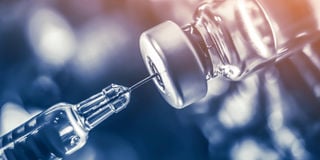One vaccine dose enough if you’ve had Covid: Study

What you need to know:
- The human immune response to vaccines and infections results in the production of antibodies
- These provide immunity and the creation of memory B cells.
- Memory B cells help in long-term immunity.
Patients who have previously been infected with Covid-19 may not need two doses of Covid-19 vaccines that use the mRNA technology, shows a study.
Covid-19 vaccines that use mRNA include Moderna and Pfizer BioNTech. The Oxford-Astrazeneca and the Johnson & Johnson vaccines are vector vaccines.
The majority of the available vaccines are being administered in two doses. Currently, Kenya is administering the Oxford-Astrazeneca vaccine’s first doses.
Antibody response
According to the research, patients who have recovered from Covid-19 were found to have an active and robust antibody response after the first mRNA vaccine dose. However, they had little immune benefit after the second dose was administered.
The research was done by the University of Pennsylvania School of Medicine’s Penn Institute of Immunology.
“This means that only a single vaccine dose may be needed to produce a sufficient antibody response in patients,” said Dr John Wherry, the director of the Penn Institute of Immunology, who led the study.
According to Dr Wherry, the human immune response to vaccines and infections results in the production of antibodies that provide immunity and the creation of memory B cells. Memory B cells help in long-term immunity.
“Memory B cells are a strong predictor of future antibody responses, which is why it was critical to measure their responses to Covid-19 vaccines,” he said.
When conducting this study, Dr Wherry and his team of scientists recruited patients who had been infected with Covid-19. Their blood samples were collected for deep immune analyses four times before and after the vaccine doses were administered.
“Those who did not have Covid-19, also known as Covid naïve, did not have a full immune response until after they got their second vaccine dose. Those who had prior infection were better off from the first dose than after taking the second dose,” said the study.



